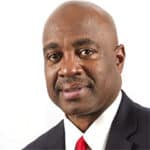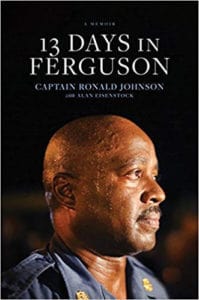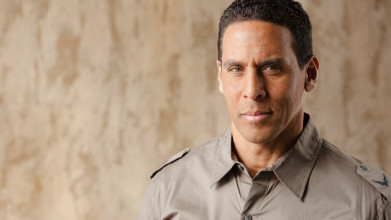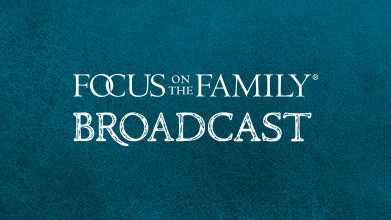Opening:
TEASER:
Captain Ronald Johnson: And for that moment, I didn’t hear any bottles being thrown. I didn’t hear any names being thrown out. It was just a – a sense of peace. And at that moment, I knew that my faith would carry me and – and guide me through. (End of teaser)
John Fuller: Last time on Focus on the Family we heard from veteran police officer Captain Ron Johnson who was put in charge of security in Ferguson, Mo., five years ago today when Michael Brown, an 18-year-old black man, was shot and killed by a white police officer. And that set off riots and protests in the city that were very, very difficult. It was a challenging time for Captain Johnson and for all of us, as we tried to find some answers and understand what was involved, really, in the situation. Well, today on Focus on the Family with Jim Daly, you’re going to hear more of the story. And I’m John Fuller.
Opening Wrap:
Jim: John, yesterday Ron Johnson shared about the terrible violence and unrest that broke loose in the streets of Ferguson, and how he tried to be that peacekeeper as a police officer, bringing healing to a volatile situation. During the turmoil, he would lock himself in a restroom and cry. You mentioned that last time, Ron. And, you know, what a picture of the stress and the pressure that you were experiencing. The whole story is captured in a great book that he’s written, 13 Days In Ferguson. It really – for believers in Christ particularly, this gives you an insight into how to express your faith in a very difficult environment, with race relations and things like that. in a moment when the tension was sky high. He’s a retired 30-year veteran police officer and is now the founder of Lodestone Solution Group, which develops and inspires leaders. Ron, I want to say welcome back.
Body:
Ronald: Well, thank you.
Jim: Let’s pick up where we left off last time. And if you missed it, I would encourage you to go the website. And John will give those details…
John: Get the app and listen. Get the download – however.
Jim: …Yeah, because it just paints such a great picture. And all of us need to be intentional about learning from these situations. And, you know, I’m speaking to the white community, too, to say you should learn what was going on, so that we can better empathize and understand what was happening. And I so appreciate Captain Ron. Can I call you Captain Ron?
Ronald: Yes, it’s fine.
Jim: (Laughter) Your perspective there in that – in that kind of volatile environment – what’s most important. So, let me first come back to that question. In that controversial moment where you decided to march with the group, the tension, I can only imagine, was crazy, because I’m sure your fellow officers did not see the wisdom of that. What are you doing aligning with those marching against us? They’re thinking this is going to break out into violence at any moment, and you’re at the head of the march with those protesters. What was that conversation like with your fellow officers, which you’re trying to lead?
Ronald: Well, you know, I think initially, many of them saw me as a traitor.
Jim: Right.
Ronald: Because these (unintelligible) had been throwing rocks and Molotov cocktails and calling them names and – and there was gunfire. And so, I think people saw me as a traitor. But also, as I walked down the street, the citizens saw me as a traitor, because they saw me in that uniform. And so, it’s kind of like you’re walking down the middle of the street and both people are tugging at you. And so, for me, a policeman, an African American policeman, and so I’m getting tugged both ways. And so, I think both sides saw this traitor walking down the street.
Jim: Where was your identity center in that moment for you, personally? When you felt that tension and these people pulling you this way and others pulling you that way, and you’re wearing this uniform that says you align with this, but who you are as a man aligns with other things. I mean, how did you find your identity? Who were you, inside your heart?
Ronald: Well, inside my heart, I always look at myself as this man first. And so, I was this man walking down the street. And I was this husband. I was his father. I was his son. I was his friend. So, I was all those other things.
Jim: Yeah.
Ronald: And so, that’s what I was when I walked down. So that became my center. And that’s why I was walking down the street. And so, I think that while there was (sic) people on both sides, that middle were saying there are people that also want peace. And I’m walking for those people that want peace, and they have that understanding.
Jim: You know, when you think about it, you were on the exact right thing to do. Even though it took incredible courage to do it. And, you know, how many of our problems in this world today could be solved with people of that courageous nature. But, we’re so few. There’s too few willing to do that. You’ve gotta risk. You’ve got to step out. What were some of the things that your fellow police officers said to you in that moment? And how were they shaping your viewpoint? You said they were expressing to you that you were a traitor. What were they saying?
Ronald: Well, some would turn their back when I walked near them.
Jim: Huh. Man!
Ronald: Some would mumble to each other. And some would not extend their hand out if I tried to shake their hand. And so, I knew what their emotions were and what they believed.
Jim: What were they – because again, most of us don’t work in a police environment – what were they afraid of? What were they objecting to? Why would they do that? Because they felt you were not defending them? That you didn’t have their back?
Ronald: Well, I think people were taking sides. And at that initial moment, it was us against them.
Jim: Yeah.
Ronald: And “them” being the protesters that were out there. And there is a difference between protesters and rioters.
Jim: Mm-hm.
Ronald: But initially, we had them all in the same bucket.
John: Hm.
Ronald: You know, protesters are out there fighting for change and wanting change. Loot rioters are out there for self-gain. And I think that, initially, law enforcement had just one team over there, and that was the rioters and looters were – protesters and rioters were the same. So, it’s us against them. But really, there is no us against them. It’s us working together to become better. But there were some law enforcement, many, who would pass me notes and say, “You’re doing a great job.” There were many that were pound on their chest or giving me that look.
Jim: That had to feel good.
Ronald: It did.
Jim: When that happened, I mean, really.
Ronald: It did. From the citizens’ standpoint. You know, it took a while, but I kept coming back. No matter what they threw at me, no matter what they said, I kept coming back. I kept listening. And in my news conferences and press conferences, I would talk about the things that they told me, so they knew that I was listening. They knew that I was seeing their face. And I wasn’t giving answers back. I was listening. I wasn’t justifying anything that had been done. I wasn’t giving reasons. I was just listening. And I think that began to build that trust. And then people started to say, “Hey, I know him. He’s been a part of this community. He’s done this. He’s done that.” And so, I think that began to validate that relationship.
Jim: Yeah, how long did the looting last? I remember the pictures of that, I mean, storefronts being broken, things being stolen. Was that over a night, or two nights? Or how long…?
Ronald: You know, it started the first couple nights. And it died down, then it started back up. But what I will say is that in the history of our nation we’ve had a number of riots around our country. When we look at the physical damage, Ferguson was the longest-lasting riot in our nation’s history, sustained riot…
Jim: Is that right?
Ronald: …For 13 straight days, yes.
Jim: Thirteen days.
Ronald: Yes, it had less damage than any other riot in our country’s history. And it had no deaths outside of the death of Michael Brown. And so, we’ve had riots that have a shorter duration, that have had deaths. So, we had less property damage, and we had no deaths. And that was one of my goals, not to have any blood on my hands. And when I would go in that bathroom and pray and lock that door, that was – I said, “God, let me not have any blood on my hands.”
John: Mmm.
Jim: Wow, and He honored that.
Ronald: He did.
Jim: That is so good, Ron. I understand you were asked to speak at a church rally for Michael Brown’s family. Describe that. We haven’t really talked much at all about the family, what they were experiencing. And we can all – again, going back to our opening comments last time – we can all have a perspective of Michael’s actions in that moment and the police officer’s actions in that moment, but it was what it was. And now, you’re there to pick up the pieces. Speak to the encounters that you had with Michael’s family, the beginning, chilly encounter, obviously, and then how that became better over time. Can you give us a picture of that?
Ronald: Well, when I went to that church to speak, I realized that no one had ever said to that family, “We’re sorry that you lost your son.” It didn’t matter what happened that day, what the cause (sic) were. Everybody had their own opinion. But someone lost their son. And so, when I got up on that stage, one of the first things that I said is that I was sorry to that family they lost their son. And then I went on that, you know, to say some other things. But after I was done, we had been asked that law – all law enforcement leave the church. And so, I was walking out of the church, and before – when I got to the door, his attorney stopped me and said, “Hey, Captain Johnson, the Brown family wants to see you.” And so, I walk in this room, and the mom and dad are there. And I went in face-to-face and told them that I was sorry, because when I spoke at the church, they were in a back room. And I just spoke to the church crowd that was there.
And I told them I was sorry that they lost their son. And I extended my hand out. And the dad extended his. But it wasn’t that hard shake. He just extended his hand with a soft grip. And they just looked at me. They never said a word, But their look said enough. But they had expectations. And then, I walked out of that church and – and after the incident, I would see him, and we wouldn’t embrace, and he would rarely speak. And one day I told him, I said, “I know you don’t want to speak to me or embrace me, because what people may think.” And I said, “But if I embrace you, I have a lot of people that look at me in a different way.” I said, “So, it’s a challenge for both of us.” I said, “But I hope one day we can hug and embrace and – and have a relationship.” And I just happened to talk to him last week. And he sent me a text on my phone. And he called me brother. And when I saw him, we embraced, and we hugged. And so, that has been really meaningful and touching.
Jim: Oh, Ron, that is. It’s so good. And, you know, we can get so hardhearted that we just go to the incident and make excuses for all that. But the fact that you said it so well, that a mom and dad lost their son, and it should drive sympathy for everybody, even if the circumstances were, you know, not – not good and how that happened. But for them it’s the loss of life. It’s the loss of a son. Can I ask you – I mean, one of the things, Ron, you’re an officer. I can see your training. You’re very uh, disciplined in how you respond. But I want to know your heart. I mean, all of this. This is what we need millions of people listening right now to hear, is how do we get through this? How do we get to a different place in this country, where we do look at each other because of the nature of our character, not the color of our skin, which Martin Luther King Jr. talked about? How do we get there? And why is it so hard? I don’t fully understand it.
Ronald: One thing that I talk about in our company, and I applaud you today, is having courageous conversations. And those conversations some time are going to hurt. But we have to talk about ourselves and reveal ourselves, and sometimes our pains that we have, and sometimes our disappointments. But I think that’s what it takes. It’s just having honest conversations. And when we do that, we become better.
When I spoke at that church, you know, I spoke in this disciplined voice, initially, but people weren’t listening. But then I realized that I needed to talk from my heart. And I talked about how I felt. I talked about how I love my son. I talked about the Bible verse my daughter gave me about Peter walking on the water. And then people began to listen.
There was a group of young men who were sitting in the front of the church, who were wearing their hats in church and had tank tops on. But they weren’t listening. But when I began to talk about myself …
Jim: Yeah.
Ronald: …talked about the love for my son and my daughter, they began to listen. And so, I think we have to be honest and have real conversations and reach out. I think sometimes when we look at things, we look at in our own world.
Jim: Yeah.
Ronald: You know, you talked about, you know, you want the white community to kind of look in a different way. We all have to look, because sometimes we – we – we live behind our titles, or behind our resources, behind the neighborhood that we live in. But there’s people out here that don’t have that environment. I heard someone talk about “no man steps in the same river twice.”
Jim: Huh.
John: Hm.
Ronald: And he’s not the same man.
Jim: Yeah.
Ronald: But in some communities that man steps in that same puddle of water every day.
Jim: Yeah.
Ronald: Because it’s still. It doesn’t move. So, that’s just something we need to talk about and be honest about.
Jim: Yeah, it’s so true.
John: And we’re talking today on Focus on the Family with Captain Ron Johnson. And we cannot commend his book enough, 13 Days In Ferguson. Get a copy. Read these stories. Hear from his heart in this book. We have copies at focusonthefamily.com/broadcast. Or call 800, the letter A and the word FAMILY.
Jim: Ron, you have a wonderful story where you learned a little lesson from a school teacher. And I want to highlight that. It was, you know, during the protests in those times. And schools, I think, were shut down. What happened in that encounter with the school teacher and her children?
Ronald: And so, I go to this makeshift school that she had started.
Jim: So, she was just trying to get kids engaged…
Ronald: Yes.
Jim: …even though schools had been shut down.
Ronald: Yeah. Yes. And she knew a lot of single parents…
Jim: Right.
Ronald: … who had no one to care for their kids. And in the community of Ferguson, a lot of those kids went to school, so they could have the three meals for that day.
Jim: Yeah.
Ronald: And so, she starts this makeshift school. And I go. And I’m talking to these kids. And, you know, the innocence of our kids is amazing.
Jim: Yeah, it is.
Ronald: But when I left, the kids gave me this sock puppet and coloring book and a box of crayons.
(Chuckling)
Ronald: And so, that night we made very few arrests. And we had taken no guns and no Molotov cocktails off of the streets. And the nights before, I would display them on a table, and I’d have the table covered up.
Jim: I remember that.
Ronald: And then I’d take the cover off and so the media could see that there were guns on the street, because there was a sense that that – we were making that up. There was a narrative that the police aren’t taking any guns, no one has guns or Molotov cocktails. But this night, I had no guns. And everybody said, “Well, what are you going to put on the table? We don’t have anything.” I said, “I want you to put that sock puppet and the coloring book and those crayons on the table.” And the media was there with their cameras waiting to see what we’d gotten. And when we took that cover off, they paused. And I talked about our kids needing to get back to school. And I talked about that day spending with the kids. And the media, the – you know, the media can be pretty tough.
Jim: Hardcore.
Ronald: But they’re crying.
Jim: Huh..
John: Hmm…
Jim: That’s something.
Ronald: Yes. And then I said, “Our kids need to go back to school.” The next day, we had less than 100 people on the streets of West Florissant.
Jim: So, that was really it.
Ronald: Yes.
Jim: That broke…
Ronald: That’s where it broke it.
Jim: Wow.
John: That seems like such a God moment. And I don’t think you had much time to really think that through. I’m guessing that was kind of a spontaneous moment that the Lord said, “Hey, display those things.”
Ronald: You know, and I talked to a group a couple years ago, when I said, “If I knew what I knew that day, the first day I was put in charge, I would’ve held up a sock puppet and a coloring book and a crayon.”
Jim: (Laughter) Right. It’s all in God’s timing, though.
Jim: Ron, I love the way the Lord has woven himself into this experience for you. I mean, He seemed to be in your corner, you know. And spurring you on at the right moment, even as you described in the broadcast the encounter with the teacher and the children and how that changed the attitudes of people. You also mentioned how critical – or implied certainly- how critical prayer became. And when you hit those moments, when your eyes were full of tears, and officers said some things that wounded you, and protesters said things that wounded you, you prayed. There are probably many people listening and watching, who are in different circumstances, maybe haven’t prayed that much in their life. They believe in God, but their prayer life has been pretty weak. What do you say to them in how prayer made a big difference in your experience? And still to this day, how prayer is different now than it was before Ferguson.
Ronald: You know, during Ferguson, there was a time where I thought this was one of the darkest moments of my life, and I felt the weakest as a leader. And I said, “You know, I’m all alone in this.” When I decided I wasn’t alone, and I got down on my knees, and I began to pray, I began to lead in a different way. I began not to be worried. And at one point, I stopped wearing my vest.
Jim: Wow.
John: This is your protective vest.
Ronald: Because – my protective vest. And because I believed that I was protected by my faith, and I didn’t need it. I did not need a shield away from the people that I was there to serve. And so, that didn’t go over well with my wife.
Jim: (Laughter) No, I can imagine.
John: Wow.
Ronald: But I didn’t need it. And that was the power of prayer. And I can tell you that I talk about in that book that there were times when I thought I was too busy to pray before Ferguson. But in my darkest moments, I never was too busy, no matter how long those days were.
Jim: Yeah.
Ronald: And no matter if I was at work, I’d take time out to go in that bathroom and pray.
Jim: Yeah.
Ronald: You know, at our – at our conferences, at our news conferences, I’d start – we would pray.
Jim: Yeah.
Ronald: At our briefings, with all the police, we would pray. And the first time that I had a briefing, and I said, “We’re gonna pray,” there were policemen that said, “He can’t make us pray. He can’t make us do that.” But by the end, every eye was closed, and some of those eyes were weeping tears. So, that faith and that prayer is so powerful, and it’s so changing.
Jim: And what a great example you set for your officers and for your community. Now, the tough stuff is not over, because you still had the decision by the grand jury not to indict the officer. They made the decision it was self-defense and those things. But that started another round of protests, correct?
Ronald: Yes. And that was a tough time for our city. A lot of buildings were destroyed.
Jim: So, it’s kind of like the beginning of the repeat of the frustration.
Ronald: It just didn’t last as long. But I think the pain was still there. It was just waiting to see what was going to happen. But our city survived. And there’s been rebuilding in Ferguson. But, yes, that was a tough night, the night of the decision.
Jim: Yeah, and, you know, again, there’s gonna be defense on all sides about those decisions and those things. But the Department of Justice investigated that, too. And they came back with some concerns about the way the police department in Ferguson had been handling things. Speak to that – more on the wider country issue, what can police departments do to do a better job when it comes to, you know, keeping law and order, bringing peace to communities? What can they do differently that can dampen down some of the racial tension that’s so connected to police activity today?
Ronald: You know, I believe that policing has to be about changing behavior. You know, someone’s speeding, the ticket means, hey, let’s slow down and make you change your behavior. But policing, in some of our communities, changes lives. It makes people lose their jobs, because of over-ticketing, over-fining. And that’s what we kind of found in some of our communities there and in Ferguson, people were – it was a part of the budget.
Jim: Wow.
Ronald: And how the city ran. And a ticket can’t become a debtor’s prison. And that’s what it became for some of the citizens that were there. And it became so impactful on their lives that it affected people losing their jobs…
Jim: Yeah.
Ronald: …people unable to feed their families and some of those things. And so, policing has to be something that is respectful. Of course, our citizens have to be respectful. But it has to be a joint level of respect. You know, and I – and I would talk to people that were out there protesting and screaming, they would tell you, “I don’t hate the police, but I want to be treated with respect. If you want me to give it, I have to give it back.” And people have to believe that that’s what they’re getting. And so – and we need to know our police. You know, in some communities we all know who the police are, and we have great encounters. And it can’t just be when something’s wrong that I see you.
5: Jim: Right, no, it’s so true. And how – how do you go about doing that in a broken world when we’re broken, when we have these fears inside of us, when we fall prey to the descriptions of how people behave? And, you know, if that young man had been better with authority, then he would have been in a better place. He probably would not have died. I mean, it’s all these emotions, Ron, that we run through and try to manage. And it just gets back to dignity, doesn’t it?
Ronald: It really does. And, you know, I talk – every life has a purpose. And, you know, I told that church, and I’ve told Michael Brown Jr.’s parents, his life had a purpose. And his purpose was to create this change in our country and in our community. And it will happen. You know, I’ll have to go back and say that police in our country have been tasked with a lot.
Jim: They have a heavy burden.
Ronald: And we’ve probably been over-tasked with some things. And this is something that together as a nation, we have to work on and be better.
Jim: Well, and that’s – there’s a lot that you’re saying there. I mean, the police, like teachers – teachers, too – they’re trying to correct a lot that has gone wrong in the culture, when it comes to respect and dignity, civility toward one another. Look at the political mess that we’re in. And it falls on people that are integrating, or as part of their job description, they have to engage the culture – right? – like police officers, firemen, teachers. And they end up having to try to correct. I have a niece who’s a teacher. She says more than a half her day is spent parenting the kids, not teaching the kids.
Ronald: Yes.
Jim: And that’s a breakdown that we’re having within the culture, when it comes to teaching the right things and how to behave.
John: And that’s at the home level, right?
Jim: Oh, that is.
John: I mean, that’s where so much of it has to happen.
Jim: It’s right there. Ron, I want to end today – again, I commend you on your courage. Thank you for writing this book. Thank you for the questions that you’re asking. You had, at the end, an encounter in a restaurant I think with your daughter…
Ronald: Yes.
Jim: …And some other men that were in this restaurant. Just paint the picture and tell us what happened.
Ronald: So, we’re in this sports bar, my daughter and I and her boyfriend. And we’re having our meal. And I look over, there’s four young white males at a table. And they’re staring over at our table. And I look at them. And they have buzz haircuts, and they’re in camouflage gear and boots and they’re drinking beer…
Jim: Kind of fit the description.
Ronald: Yes. And so, I look at them. And – and they keep looking at me. And so, I tell my daughter, I said, “You know, during Ferguson everyone didn’t agree with my decisions. And I knew that at some point, probably when I’m out in the community, I’d be confronted by some of those individuals.” And I said, “I think tonight’s the night.” And I said, “There’s four gentlemen at the table.” I said, “They’ve been looking over here. They’ve been having a conversation that I believe concerns me.” And I said, “Don’t turn around.” Of course, she turns around. But I told her – I said, “I want you and your boyfriend to go out to the car, and Dad will be OK and I’ll pay the bill and I’ll come out.” And then she says, “Well, you need you to call mom.” So, I’ve been a trooper for 27 years and she tells me I need to call my wife. And I said, “No, I’ll take care of it.”
John: So, this is a potential flashpoint situation here.
Ronald: Exactly.
John: You’re thinking this could go physical.
Ronald: Yes. And so, the waitress comes over. And I said, “I need the bill.” And she said, “Someone’s paid your bill.” And I said, “Well, who?” And she says, “Well, they want to stay anonymous.” I said, “No, please tell me who, because I want to thank them.” So, she points over to the corner of the restaurant where the four young men are, but I look at everybody in that section but them. And I said, “I don’t see who you’re pointing to. Who is it?” She goes, “The guys right over there.” I said, “I don’t see any guys right over there.” And she said, “The four gentlemen at the table.”
Jim: Wow.
Ronald: …”with the camouflage on.” And so, I got up and I walked over, and I talked to them. I said, “Why’d you pay for my bill?” I said, “Thank you,” but I said, “Why did you pay for my bill?” And they said, “Because we appreciate what you’ve done for our community.” And so, I tell people that story, so we all have this unconscious bias that we have.
Jim: Sure.
Ronald: And that’s not the problem; the problem is what we do with them.
Closing:
Jim: Yeah. And Ron, so beautifully what you’ve said over and over again is people need to feel respected. And I think that’s the great takeaway from our discussion these last couple of days, is when you’re in a situation, try to show people respect and dignity. I think that’s the Christian calling. I really do. And you’ve expressed that so well. And I hope people get a copy of your book right here through Focus on the Family. We need to talk about this. We need to explore it honestly, freshly, and then ask the Lord to shine light on our attitudes, our biases and how we can see things differently, from a Godly perspective.
Ronald: Yes.
Jim: And I know you agree with that. But thank you for the example that you’ve been, and, man, more of us need to engage in this way. Thank you, Ron.
Ronald: Well, I thank you guys for having me.
Closing Voice Track:
John: And be sure to call today, if you can, or stop by the website and get a copy of 13 Days In Ferguson, by Captain Ron Johnson. You will find this book changing your thoughts and perhaps challenging some of those biases that he just mentioned, we all seem to have. Our number is 800, the letter A and the word FAMILY. 800-232-6459. Online we’re at focusonthefamily.com/broadcast.
And if you can, please make a generous donation of any amount, and we will say thank you for joining our support team. We’re listener supported. We need your prayers and your financial gifts. Make a pledge or a one-time gift of any amount, and we’ll say thanks by sending a copy of this great book to you.
On behalf of Jim Daly and the entire team, thanks for joining us today for Focus on the Family. I’m John Fuller, inviting you back, as we once again help you and your family thrive in Christ.


















